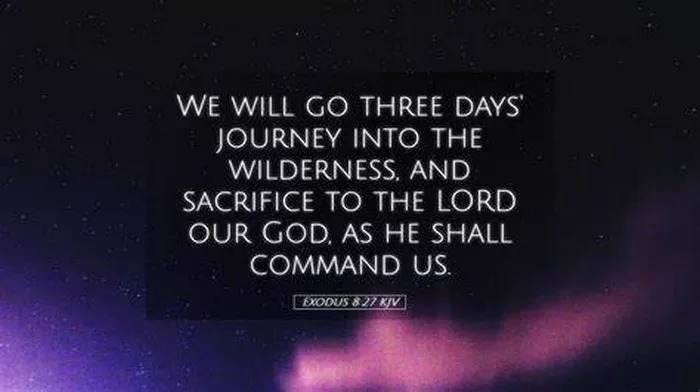Read the Daily Bible Verse – Exodus 8:27 To Strengthen Your Spiritual Journey.
Exodus 8:27 is a verse that reflects a critical moment in the dialogue between Moses and Pharaoh during the plagues in Egypt. It reads in the King James Version (KJV):
“We will go three days’ journey into the wilderness, and sacrifice to the LORD our God, as he shall command us.”
This verse highlights Moses’ plea to Pharaoh for the Israelites to worship God freely, setting the stage for a broader understanding of God’s sovereignty, human freedom, and worship. In this article, we will explore the context, meaning, application, and modern-day relevance of this verse.
The Context on Exodus 8:27 KJV
Historical Background
The Book of Exodus documents the Israelites’ journey from slavery in Egypt to liberation and covenant with God. By the time we reach chapter 8, God has already begun sending plagues upon Egypt to compel Pharaoh to release the Israelites. These plagues demonstrate God’s power and judgment against Egypt’s oppression and idolatry.
Immediate Context
Exodus 8:27 is part of Moses’ dialogue with Pharaoh during the fourth plague—flies. In verse 25, Pharaoh offers a compromise: the Israelites can worship God, but only within Egypt. Moses refuses this offer, explaining that the Israelites’ worship involves practices offensive to the Egyptians, such as the sacrifice of animals considered sacred by Egyptian culture. The request for a three-day journey into the wilderness signifies a complete separation from Egyptian society for proper worship.
The Meaning of Exodus 8:27
Freedom to Worship
Exodus 8:27 emphasizes the importance of worshiping God according to His commands, not human convenience or cultural expectations. Moses insists that the Israelites’ worship must align with God’s instructions, even if it requires significant effort and confrontation with worldly powers.
Symbolism of the Wilderness
The “three days’ journey into the wilderness” is symbolic of separation, purification, and devotion. The wilderness often represents a place of encounter with God, free from distractions and idolatry. By requesting this journey, Moses underscores the Israelites’ need to break away from Egypt’s influence to fully devote themselves to God.
God’s Sovereignty
This verse reflects God’s supreme authority over both His people and the nations. Pharaoh’s refusal to comply with God’s command is met with escalating consequences, revealing God’s control over nature and human history.
Exodus 8:27 Application in Life
Obedience in Worship
Exodus 8:27 reminds believers of the importance of obeying God’s commands in worship. Modern worshippers must prioritize God’s instructions over societal pressures or personal preferences.
Seeking Spiritual Freedom
Just as the Israelites sought freedom to worship God, believers today should strive for spiritual freedom from sin, distractions, and worldly influences that hinder genuine devotion.
Trusting God in Adversity
Moses and the Israelites faced significant opposition in their quest for worship. Similarly, believers may encounter challenges when standing firm in their faith, but Exodus 8:27 encourages trust in God’s power to overcome these obstacles.
Comparison with Other Biblical Texts
Worship in the Old Testament
Leviticus 26:1-2: Emphasizes the importance of worshiping God without idolatry.
Deuteronomy 6:13: Commands exclusive worship of the Lord, reinforcing the principle in Exodus 8:27.
Worship in the New Testament
John 4:23-24: Jesus teaches that true worshipers must worship “in spirit and truth,” aligning with the sincerity and obedience highlighted in Exodus 8:27.
Romans 12:1: Paul describes offering oneself as a living sacrifice, which parallels the Israelites’ physical sacrifices as acts of devotion.
The Theme of Deliverance
Exodus 8:27 resonates with broader biblical themes of deliverance, such as:
Isaiah 61:1: Proclaims liberty for captives, echoing the Israelites’ quest for freedom to worship.
Galatians 5:1: Declares freedom in Christ, reinforcing the spiritual liberation symbolized in Exodus.
Modern-Day Relevance
Worship in a Secular World
In contemporary society, believers may face restrictions or challenges to practicing their faith openly. Exodus 8:27 serves as a reminder to prioritize God’s commands over societal expectations or opposition.
The Role of Sacrifice
While animal sacrifices are no longer required under the New Covenant, the principle of offering our best to God remains relevant. This may involve dedicating time, resources, and effort to worship and service.
Advocacy for Religious Freedom
Exodus 8:27 also inspires believers to advocate for religious freedom and stand against oppression, ensuring that all people have the opportunity to worship God according to their convictions.
Conclusion
Exodus 8:27 is a powerful verse that underscores the importance of worshiping God according to His instructions, even when it requires separation from worldly influences. Its lessons about obedience, freedom, and perseverance remain relevant today. By studying this verse in its historical, theological, and practical contexts, believers can gain deeper insight into their relationship with God and their responsibility to worship Him in spirit and truth.
As we reflect on Exodus 8:27, may we be inspired to pursue a life of wholehearted devotion, trusting in God’s sovereignty and provision to lead us into true freedom and worship.
Exodus 8:27 Commentary
Traditional Perspectives
Traditional commentaries, such as those by Jewish scholars like Rashi, focus on the cultural clash between Israelite worship practices and Egyptian customs. They highlight the necessity of physical and spiritual separation to maintain the integrity of worship.
Christian Theological Insights
Christian commentators often emphasize the typology in Exodus 8:27, seeing the Israelites’ exodus as a foreshadowing of salvation through Christ. The journey into the wilderness represents the believer’s spiritual journey from sin to sanctification.
Practical Lessons
Commentators frequently point out the courage and persistence of Moses in advocating for God’s will. This serves as an example for modern believers to uphold God’s truth in the face of opposition.
You Might Be Interested In:

